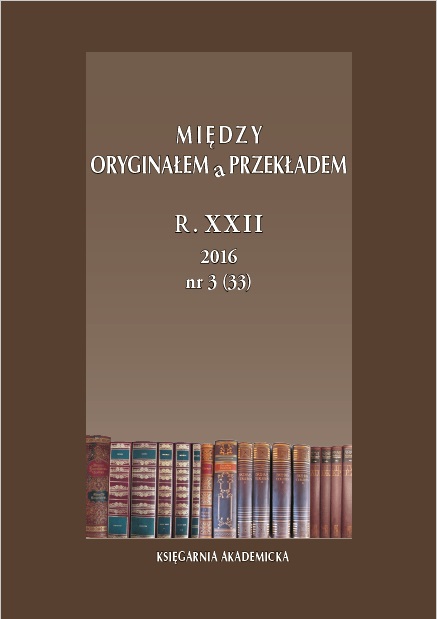Traducir a Gombrowicz al español, pero… ¿a qué español? Apuntes sobre la traducción (peninsular) al español (¿neutro?) de 3 cuentos inéditos de Witold Gombrowicz para una editorial (argentina)
Translating Gombrowicz into Spanish, but… into which Spanish? Notes on a (peninsular) translation into (standard?) Spanish of 3 unpublished tales by Witold Gombrowicz for an (argentinean) publishing house
Author(s): Pau Freixa TerradasSubject(s): Language and Literature Studies, Translation Studies
Published by: KSIĘGARNIA AKADEMICKA Sp. z o.o.
Keywords: Witold Gombrowicz; Literary translation; neutral Spanish, Literary translation in Argentina; Polish‑Spanish literary translation
Summary/Abstract: When translating Witold Gombrowicz is itself quite difficult, doing it to Spanish shows some particular problems. This polish author that spent almost 24 years in Argentina, re‑wrote two of this Works into Spanish and published in that language some articles and speeches which only later were translated (or re‑translated into polish). For these reasons Gombrowicz is often considered a Spanish‑speaking author, too. Translating any writer into Spanish presents some general specific problems: It’s a language divided in many dialects, spoken as a modern‑tongue by more than 400 million, distributed in 20 countries over two continents, which put some questions about how to translate depending on the reader to which the translation is intended. In the case of Gombrowicz, it’s as well important the fact the Spanish spoken in Buenos Aires was his everyday life language during more than two decades. Should Gombrowicz’s works be translated into neutral/peninsular Spanish (the most popular in literary translation considering that the biggest publishing houses in Spanish are set in Spain) or should we look for the author’s porteño voice? Should the translator try to get close to the strange gombrowiczean Spanish used in the Argentinean Ferdydurke? The present article will try to answer these questions on the basis of the experience of translating (in Spain) three previously unpublished tales for an Argentinean publishing house.
Journal: Między Oryginałem a Przekładem
- Issue Year: 2016
- Issue No: 33
- Page Range: 83-97
- Page Count: 15
- Language: Polish

